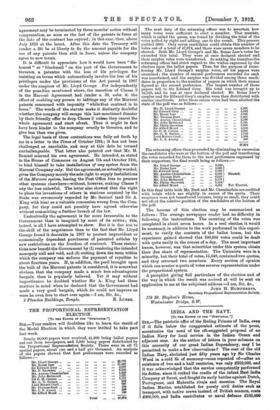THE PROPORTIONAL REPRESENTATION ELECTION.
[TO THR EDITOR OP TIM "EPEOTATOR.1
Sin,—Your readers will doubtless like to learn the result of the Model Election in which they were invited to take part
last week.
Nearly 48,000 papers were received, 41,300 being ballot papers cut out from newspapers, and 6,600 being papers distributed by the Proportional Representation Society. There were in all 71 spoiled papers, about one aad a half per thousand. An analysis of the papers showed that first preferences were recorded as follows :—
Mr. Lloyd George ... ... ..,
Mr. Bonar Law ... ... f••
Sir Edward Grey ... ... ...
Mr. P. Snowden ... ... ...
Mr. Austen Chamberlain ... Mr. John Redmond ... Sir E. H. Carson ... ... Mr. G. N. Barnes ... ... Lord Robert Cecil .. ... Mr. Thomas Burt ... ... Mr. L. S. Amery ... ... Sir Alfred Mond ... ... ... Total
1,14 •••
••• •••
••• •••
•••
••11 •••
as. .64
••• ••• ••• ••• ••• ••• ••• •••
"It ••■
••• •••
••• .11
••• ••• ••• •••
••• 47,e74
22,778 11,857 3,997 2,585 1,626 1,221 1,171
:
787 576 208 180 The next duty of the returning officer was to ascertain how many votes were sufficient to elect a member. This number, which is called the quota, was found by dividing the total of the votes polled by eight and adding one to the result. This process yielded 5985. Only seven candidates could obtain this number of votes out of a total of 47,874, and there were seven members to be elected. Both Mr. Lloyd George's and Mr. Bonar Law's votes far exceeded this total. They were at once declared elected and their surplus votes were transferred. In making the transfers the returning officer had strict regard to the wishes expressed by the electors upon the ballot papers. Thus, for the purpose of trans- ferring Mr. Lloyd George's surplus votes, all his papers were examined ; the number of second preferences recorded for each was ascertained, and the surplus was divided among these candi- dates in proportion to the number of papers on which their names figured as the second preference. The largest number of these papers fell to Sir Edward Grey. His total was brought up to 16,329, and he was at once declared elected. Mr. Bonar Law's surplus and Sir Edward Grey's surplus were then distributed with similar exactitude. After these excess votes had been allotted the state of the poll was as follows :—
Mr. D. Lloyd George ...
Sir Edward Grey Mr. Bonar Law ...
Mr. Thomas Burt... ... Mr. Austen Chamberlain Mr. John Redmond Mr. Philip Snowden Sir Alfred Mond Sir E. H. Carson ... Mr. G. N. Barnes ... Lord Robert Cecil... Mr. L. S. Amery
47,874 The returning officer then proceeded by eliminating in succession the candidates who were at the bottom of the poll and transferring the votes recorded for.them to the next preferences expressed by their supporters, the final result being as follows :—
Mr. Lloyd George ... ...
Mr. Boner Law ... ... ...
Sir Edward Grey ... ... ••• ... 5,985 Mr. Austen Chamberlain ... ... ... 6,092 Elected. Mr. Thomas Burt .., ..„ ... ... 6,025 Mr. John Redmond ... ... ... 5,679 Mr. Philip Snowden ... ... ... 5,124, Sir Alfred Mond ... ... — ... 4,202 Not Elected.
In this final table both Mr. Burt and Mr. Chamberlain are credited with totals which are slightly in excess of the quota. Their surpluses were not transferred because, being so small, they could not affect the relative position of the candidates at the bottom of the poll.
The lessons of this election may be summarized as
follows : The average newspaper reader had no difficulty in following the instructions. The counting of the votes was completed in about seven hours. In a real election it would be necessary, in addition to the work performed in this experi- ment, to verify the contents of the ballot boxes, but the experience gained showed that 100,000 votes could be dealt with quite easily in the course of a day. The most important lesson, however, was that minorities under this system obtain their due share of representation. The Unionists were in a minority, but their total of votes, 15,649, contained two quotas, and they returned two members. Every section of opinion which can muster a quota of votes secures representation under the proportional system.
A pamphlet giving full particulars of the election and of the way in which the result was arrived at will be sent on application to me at the subjoined address.—I am, Sir, &c.,
••• ••• ••• ••• • •• ••• ••• ••• ••• ••• .•• ••• ••• •••
••• •••
••• ••• ••• ••• ••• •••
••• •••
••• ••• ••• ••• ••• ••• ••• ••• ••• •••
5,085 5,985 5,985 5,421 5,396 5,321. 3,908 3,680 2,841. 1,748 1,305 299
JOHN H. HUMPHREYS,
Secretary Proportional Representation Society. 179 St. Stephen's House, Westminster Bridge, S.W.






































































 Previous page
Previous page